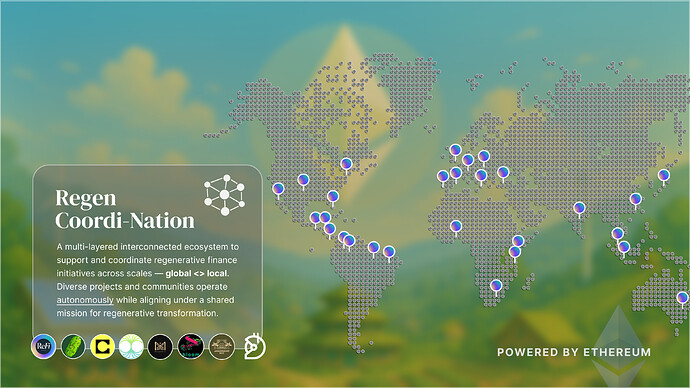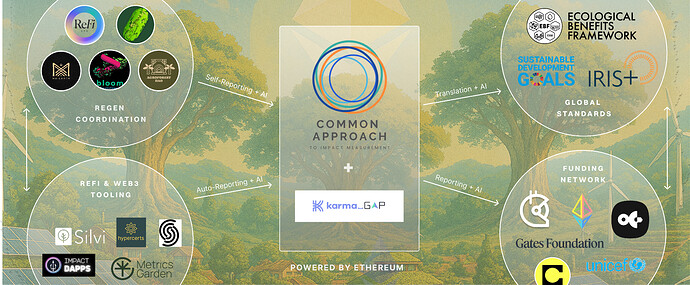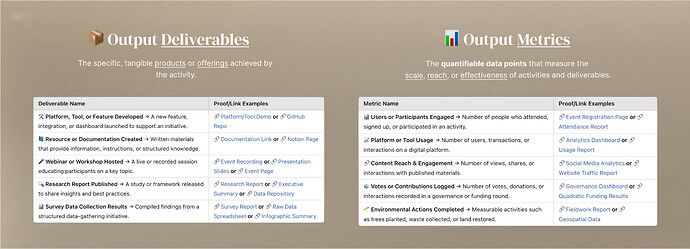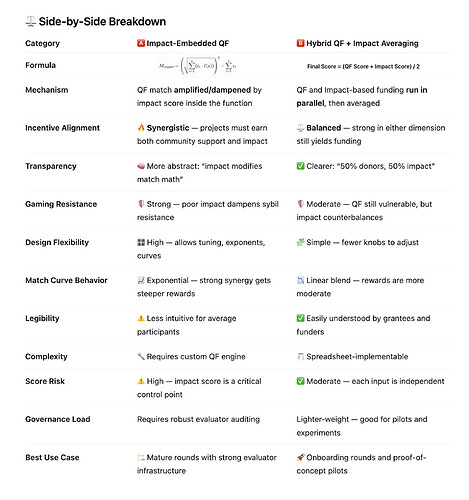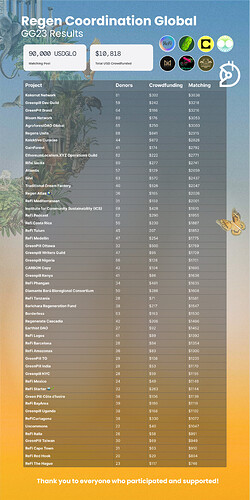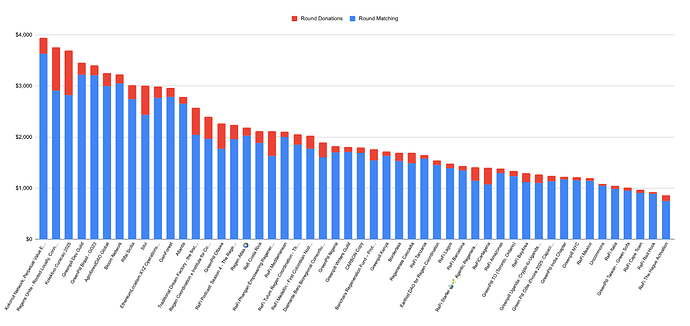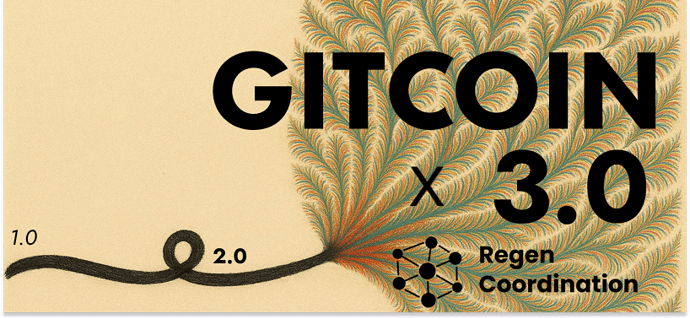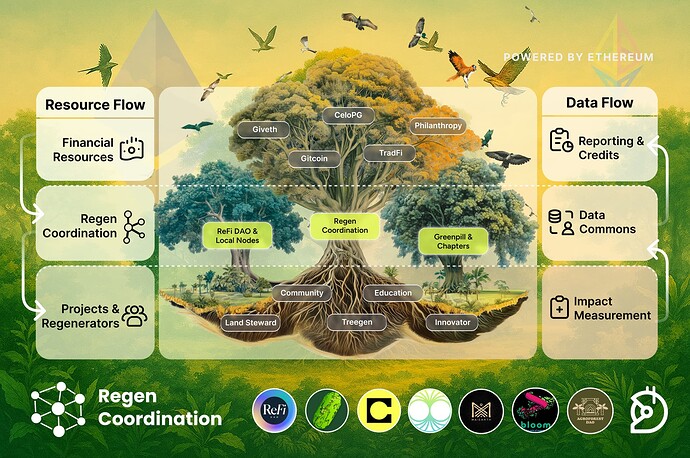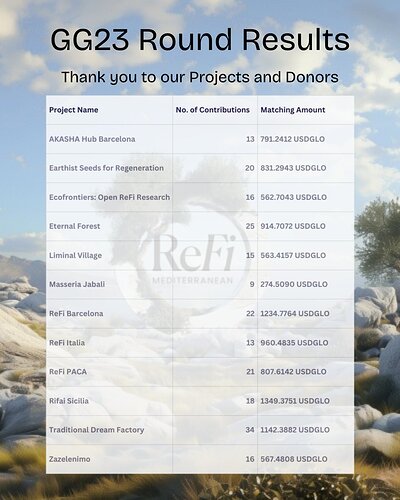Overview
The Regen Coordination Global GG23 round has been our most ambitious and innovative experiment in regenerative funding to date. With a $96,000 matching pool raised, this round supported 50 projects working at the intersection of ReFi, Ethereum, and local ecological, social, and economic regeneration.
Key Results
579 unique donors
$10,817 in contributions
$90,000 in matching funds distributed, and further $6,000 to be allocated in partnership with DeepGov through further AI evaluation and allocation agents.
See Round Report Card for more.
This global round ran in parallel with two regional partner rounds — ReFi Mediterranean and Regen Rio de Janeiro — as part of a coordinated effort to localize regenerative public goods funding and build momentum towards a cosmo-local network of ReFi grantmaking. Furthermore, we also launched the Regen Coordination Digital Public Goods Round on Gitcoin, delivering $30k in direct grants to key supporting infrastructure projects, including Karma GAP, Zazelenimo, and the Local ReFi Toolkit Funding Pool.
Altogether, these rounds have ALLOcated $159,732 in capital across programs so far in 2025. We’re deeply grateful to the ecosystem leaders, sponsors and partners who made these experiments possible → Gitcoin, Celo Public Goods, Ma Earth, Kevin Owocki, ReFi DAO, Greenpill Network and others.
Beyond the numbers, GG23 served as the first pilot of the AI + ImpactQF methodology — a system we believe could become one of the leading mechanisms for Web3 grant funding. This post will serve as a case study of the methodology we deployed, our key learnings and the future vision from here.
Case Study: AI ImpactQF 
For this round, we combined three powerful innovations:
-
A Common Approach to Impact Measurement (implemented through Karma GAP)
-
AI-Enhanced Evaluation (GPT-4o & Claude 3.7 + Coordination Council)
-
ImpactQF (Impact-Weighted Quadratic Funding)
This approach enables a scalable, transparent, and rigorous impact evaluation and funding system to complement quadratic funding by aligning matching allocations with demonstrated outcomes — not just marketing or social capital. Here’s how it worked ![]()
1) Common Approach to Impact Measurement
The Common Approach to Impact Measurement is a set of frameworks designed to support organisations and institutions in measuring, managing, and communicating impact in a way that is both rigorous and flexible. It addresses the tension between standardized metrics and context-specific approaches by creating interoperable and adaptable standards.
CIDS (Common Impact Data Standard) is a data ontology that enables structured, semantic, and machine-readable impact data. It enables:
- Flexible representation of any impact model (logic model, impact thesis, etc.)
- Interoperability between systems and standards (e.g. SDGs, IRIS+)
- Integration of the five Impact Management Project (IMP) dimensions: What, Who, How much, Contribution, and Risk
- Use by multiple software platforms for consistent and shareable data.
For anyone interested in exploring further, the Common Approach Impact Ontology resource offers detailed information.
Regen Coordination has been directly supporting the integration of the Common Approach into the KarmaGAP platform, enabling more effective tracking and evaluation of project activities, outputs and impact. Furthermore, to support onboarding and context development, we also developed templates, graphics and guides to support projects in effectively understanding and using the system.
Impact Reporting Guidance | Regen Coordination
How to Use AI for Activity & Output ReportingWe also translated materials into both
Spanish and
Portuguese.
2) AI-Augmented Evaluation
To process and assess a high volume of data from 50 projects in the round with consistency, transparency, and speed, Regen Coordination used a hybrid AI + human evaluation process. This approach ensured each application was rigorously evaluated on its merits using both structured AI analysis and expert human judgment.
Analyzing the Gitcoin application + Karma GAP project data, we leveraged two leading models — GPT-4o (OpenAI) and Claude 3.7 (Anthropic) — to generate detailed independent reports for every project in the round. These dual evaluations allowed us to cross-compare results and reduce model-specific bias — increasing robustness and confidence in our findings (see Evaluation Comparison: Claude 3.7 vs GPT-4o).
In alignment with Regen Coordination’s Core Mission and North Star Outcomes, the evaluations were structured around five key criteria:
Increase Awareness, Engagement, Adoption, and Development of ReFi Web3
Increase Awareness, Adoption, Development, and Financial Activity on Celo, Ethereum, and the Ethereum-Aligned Ecosystem
Directly Create or Catalyse Local Ecological, Social, and Economic Impact
Resources, Maturity, and Past Funding Compared to Impact Delivered
Active Goals, Plans, Milestones and Objectives
The AI Models scored each project on a 1–10 scale against each of these 5 criteria with the detailed evaluation rubrics we developed to support rigorous and comparable assessment. Each model worked in a clean prompt environment, with no cross-contamination or prior context, ensuring clarity and impartiality.
All reports included detailed narrative evaluation of project impact and activities, scoring and rational across the five rubric areas, and highlights of strengths, risks, and areas for improvement.
You can browse the full reports here:
These baseline AI evaluations were then reviewed by the Coordination Council, made up of evaluators from ReFi DAO, Celo Public Goods, and Greenpill Network. Each project received at least three independent human reviews, with scores averaged and used as the final impact evaluation rating.
This hybrid approach reflects the paradigm described by Vitalik Buterin:
“AI as the engine, humans as the steering wheel."
AI provides the efficiency and structured analysis needed to scale, while human reviewers bring strategic judgment, contextual insight, and ethical oversight.
Further details on our process here: Project Evaluation Methodology | Regen Coordination
3) ImpactQF (Impact-Weighted Quadratic Funding)
Once impact evaluations were completed, we integrated the final Coordination Council reviewed scores directly into the matching fund allocation. As such, this round represented the first completed implementation of ‘ImpactQF’ — an idea originally proposed by Sharfy and David Dao of GainForest to align quadratic funding with verified impact outcomes. The problem this model addresses is well-known: regular QF can become a popularity contest, over or under rewarding projects based on marketing skills and ability to mobilize donor networks rather than underlying impact.
For this round, we implemented a Hybrid ImpactQF Model — meaning that instead of modifying the quadratic formula itself, our method ran two evaluation tracks in parallel:
-
COCM Score - 50% of matching was based on the default Gitcoin QF COCM results — reflecting the number of unique donors, donation clusters, and total contributions per project.
-
Impact Score - 50% was based on the project’s final impact score — derived from the AI-generated reports and the reviews by human evaluators.
This model helped to balance crowdfunding signal with evidence-based evaluation to ensure that both community support and demonstrated outputs shaped funding allocation.
Why the Hybrid Model?
For our first implementation of ImpactQF, the Coordination Council voted for this hybrid model on the basis that it would be better suited for getting our community introduced and accustomed to the new methodology. See below for a detailed comparison of the mechanisms.
In future rounds, we aim to shift toward a fully impact-embedded QF system where we internalise the impact score directly into the match formula. Until then, the Hybrid Model offers a practical and high-integrity stepping stone. Going forward, Regen Coordination is actively collaborating with Gitcoin, DeepGov, and others to explore these next-stage systems — and is committed to further evolving the ImpactQF landscape.
 Results & Analysis
Results & Analysis
Explore full results & reports: GG23 Results Sheet
(Includes: AI reports, scoring, final match allocations)
The final allocations reflect the success of the hybrid ImpactQF approach in balancing grassroots support and measurable regenerative outcomes. While traditional QF rounds have mostly favoured projects with large donor networks or slick promotion, this round ensured resources were allocated to impactful projects which may have otherwise been overlooked.
Key Trends:
-
Projects with strong community backing and high impact (e.g. Kokonut Network, Gainforest, Greenpill Dev Guild, Atlantis) received significant relative matching — confirming the power of aligned public and evaluator support.
-
Several high-impact but lower-donor projects saw their matching significantly boosted through the process — helping re-balance outcomes that would otherwise have skewed toward popularity.
-
A few projects that garnered strong QF support but had low impact scores saw their relative final allocations lowered accordingly — illustrating the effect of the hybrid model in prioritizing impact over popularity.
Key observations:
-
No extreme outliers: The highest-matched project received under $4,000, and the drop-off is gradual across the entire dataset.
-
Healthy middle: A substantial number of projects landed in the $2,000–$3,500 range, suggesting the hybrid model rewarded a broad set of contributors rather than concentrating funds.
-
Reduced tail effect: The lower end of the distribution still received meaningful relative allocations (mostly >$1,000). Funding is more evenly spread across the ecosystem — rewarding a wide diversity of approaches, regions, and organizational maturity levels.
Testimonials
“A great round and amazing to receive the feedback after the evaluation. appreciate all the team and sponsors. massive job done in organizing this round from point A to point B”
“Quite exciting to see the way funds were allocated this time. Good to see it going beyond wisdom of the crowds”
“It was a well-documented program with all the resources for donors and grantees to make informed decisions every step of the process.”
“It was a very detailed process with multiple layers of evaluation, a balanced approach.”
Learnings & Reflections
The Regen Coordination Global GG23 round was a bold and complex experiment — and like any pilot, it generated critical insights to help refine future iterations of the methodology. Here are a few of the key takeaways from the Coordination Council:
1. Flattened Distribution = Greater Equity, But Less Variance
While the Hybrid ImpactQF model succeeded in avoiding the pitfalls of pure popularity contests, the resulting matching distribution was relatively flat and linear, with less differentiation between projects. This helped create a sense of fairness and broad inclusion — but may also have under-rewarded the most exceptional performers.
![]() In future rounds — especially as impact data integrity and matching fund amounts increase — we may evolve toward Impact-Embedded QF, where impact scores directly influence match size inside the formula. This would allow greater reward variance and further sharpen incentives around impact outcomes, while maintaining the community voice at the heart of QF.
In future rounds — especially as impact data integrity and matching fund amounts increase — we may evolve toward Impact-Embedded QF, where impact scores directly influence match size inside the formula. This would allow greater reward variance and further sharpen incentives around impact outcomes, while maintaining the community voice at the heart of QF.
2. Explore Differentiated Evaluation Tracks
While the evaluation rubric ensured consistency, it occasionally struggled to equally serve local on-the-ground regenerative communities and digital public goods /software teams (e.g. Atlantis, GainForest, Regen Atlas, Silvi). Each of these groups operate with different resources, visibility, and output patterns, making apples-to-apples scoring challenging.
![]() In future rounds, we may introduce separate evaluation tracks or tailored rubrics — allowing software, infra, and digital tool builders to be assessed using more appropriate metrics (e.g., usage data, dev activity, integrations), while maintaining strong standards for place-based community work.
In future rounds, we may introduce separate evaluation tracks or tailored rubrics — allowing software, infra, and digital tool builders to be assessed using more appropriate metrics (e.g., usage data, dev activity, integrations), while maintaining strong standards for place-based community work.
3. Impact Reporting Infrastructure Is Maturing, But Still New
GG23 was the first usecase of Karma GAP’s new Common Impact Data Standard (CIDS) aligned reporting system, enabling structured activity and output tracking across all projects. While the foundation was strong, we encountered expected early-stage challenges around UX, data consistency, and reporting quality.
![]() Looking forward, we aim to improve ease of use, deepen integrations with ReFi apps and onchain data sources, and automate more reporting processes — ultimately making impact evaluation easier and more useful for all stakeholders.
Looking forward, we aim to improve ease of use, deepen integrations with ReFi apps and onchain data sources, and automate more reporting processes — ultimately making impact evaluation easier and more useful for all stakeholders.
4. AI-Enhanced Evaluation Is Ready
One of the most promising outcomes of this round was the successful deployment of a hybrid AI + human evaluation model. The dual-model approach (GPT-4o and Claude 3.7) produced consistent, high-quality reports that supported rigorous impact scoring and gave both human evaluators and grantees detailed, actionable feedback and insights. However, despite these strong results, the current processes were manual and time consuming to execute — requiring data scraping, detailed prompt design with iterative testing, cycling each project individually through multiple models, manual review of AI generated evaluations, and compiling scores into the final scoring spreadsheet.
![]() Going forward, we will build on the foundations already established and iterate further — experimenting with more agent-based review flows, deeper prompt tuning, and the automation and productisation of the process with partners like KarmaGAP, DeepGov and others. Ultimately we aim to significantly reduce friction, improve accuracy, and make it easier for other rounds to replicate and adopt the ImpactQF model.
Going forward, we will build on the foundations already established and iterate further — experimenting with more agent-based review flows, deeper prompt tuning, and the automation and productisation of the process with partners like KarmaGAP, DeepGov and others. Ultimately we aim to significantly reduce friction, improve accuracy, and make it easier for other rounds to replicate and adopt the ImpactQF model.
5. Increasing Cross Pollination and Collaboration
A deep insight from the evaluations was the high potential for collaboration between projects to strengthen ecosystem-wide outcomes. Throughout the review process, a clear pattern emerged: some projects demonstrated strong local impact but limited onchain or ReFi integration, while others excelled in ReFi/Web3 tooling but lacked grounded, community-based activity. This divergence is encouraging as it shows we have a complementary ecosystem where projects can support each other in progressing in their weaker dimensions.
![]() As we design future rounds, we want to optimize for collaboration and cross-pollination as core evaluation and ecosystem principles. Potential directions include:
As we design future rounds, we want to optimize for collaboration and cross-pollination as core evaluation and ecosystem principles. Potential directions include:
- Allowing projects to attribute shared impact across multiple collaborators.
- Introducing lightweight peer review and endorsement tools (e.g. DeVouch) to surface trust and relational signal.
- Hosting collaboration-focused workshops to foster intentional partnerships between grantees.
- Using the upcoming Regen Coordination Hub to share ideas and cross pollinate
Next Steps & Future Vision
Building on learnings from GG23, Regen Coordination will double down on its mission to support the growth and coordination of the ReFi and Ethereum Localism movements — and aim to act as a dedicated domain expert within Gitcoin 3.0 and beyond.
Here are some of the key next steps we will prioritize ![]()
1) Strengthening Governance and Community Participation
Regen Coordination began as a partnership between Celo Public Goods, Greenpill Network, and ReFi DAO — and has since grown to include additional aligned communities. As we seek to scale further, establishing a more transparent and participatory governance framework is a top priority. This includes evolving the Greenpill forum into a Regen Coordination Hub, hosting regular coordination calls and workshops, and co-creating documentation to define council roles, processes, and fund allocation.
We want this process to be community driven, if you have thoughts to add or feedback on what is currently suggested please share.
2) Automating and Productizing the ImpactQF Stack
To scale the model implemented in this round we seek to evolve the ImpactQF methodology into a more automated, composable, and user-friendly system — making it easier for other communities and ecosystems to adopt. With the winding down of Gitcoin Grants Stack, we’re actively exploring what a new integrated ImpactQF tech stack could look like — combining best-in-class tools from across the ecosystem.
Some exciting possibilities include:
-
Karma GAP as the core data layer — with all project profiles, impact metrics, and activity/output reports standardized using Common Impact Data Standard (CIDS), and added automation with further integrations with leading ReFi Web3 apps.
-
DeepGov to power AI agent workflows and enable streamlined human evaluation interfaces — reducing friction in scoring, review, and aggregation.
-
Self.xyz to provide secure, privacy-preserving identity verification — enabling sybil-resistant quadratic funding without compromising UX or accessibility.
-
Allo Protocol as the underlying distribution and allocation smart contracts.
-
Mainstream payment integrations (e.g. cards, PayPal, Apply Pay) to lower barriers for new donors and onboard fiat capital into onchain regenerative funding flows.
-
Prosperity Pass and Divvi.xyz as mechanisms to track and incentivize adoption of key ReFi tools and behaviors, as well as measuring Total Value Flowed (TVF).
Together, these tools could form a modular, interoperable stack that enables communities anywhere to run their own ImpactQF rounds — from local regenerative hubs to global and bioregional networks. While still in early stages, these explorations point to a future where impact-embedded funding is easy to run, replicate, and trust at any scale.
3) Expanding a Global Network of Local Funding Rounds
Alongside the global round, community-led experiments in the Mediterranean and Rio de Janeiro successfully mobilized local donors and matched capital to grassroots regenerative projects. Looking ahead, Regen Coordination is exploring how this model could scale — evolving into a cosmo-local network of bioregional and community-driven funding rounds. Each round would be tailored to its unique context, yet aligned through shared values, methodologies, and infrastructure.
As part of Gitcoin 3.0’s shift toward Dedicated Domain Allocation (DDA), Regen Coordination aspires to lead as a dedicated domain expert for ReFi and Ethereum Localism. We’re exploring whether a structure like a Regen Coordination Grantship could serve as a coordination layer — offering technical, evaluative, and strategic support to local rounds while creating pathways for these communities to access matching funds. Over time, this could create healthy competition among communities to demonstrate regenerative outcomes and Total Value Flowed (TVF) within local Web3 economies.
To support this ecosystem, we continue to develop and refine the Local ReFi Toolkit — a practical, accessible resource to help communities launch and sustain regenerative economies using Web3 tools. The toolkit aims to lower entry barriers and empower communities to bring Ethereum Localism to life.
4) Cosmo-Local Capital Flows
To date, Celo Public Goods and Gitcoin have been Regen Coordination’s primary funding partners — providing essential early support for piloting regenerative funding infrastructure and methodologies like ImpactQF. Going forward, we see promising opportunities for “matching-on-matching” dynamics, not only with other crypto-native sources such as Ethereum, Octant, and ecosystem-aligned organisations, but also through systems that blend global Web3 infrastructure with local governance, public institutions, and place-based finance. This pathway could enable us to help unlock and de-risk additional capital from municipal governments, public agencies, philanthropic foundations, and institutional actors. If done well, this could dramatically expand the resources flowing into regenerative initiatives.
One live example is our partnership with Zazelenimo — an urban greening initiative in Split, Croatia, which Regen Coordination is sponsoring and supporting. Their upcoming pilot will blend Ethereum-aligned participatory funding infrastructure with a 3:1 local municipal match, enabling citizen-led urban greening through a public–private–community capital stack. If successful, this model could be replicated globally — empowering cities to launch regenerative funding rounds, develop local currencies, and embed Web3 infrastructure into civic processes.
We’re also part of early discussions with UNDP and other institutional stakeholders, exploring how onchain tooling and regenerative methodologies could align with global sustainability frameworks. As these conversations progress, we believe Regen Coordination can serve as a bridge between Web3 innovation and real-world transformation — powering cosmo-local flows of capital that fund what matters for people and planet.
Vision
‘What does it look like if Regen Coordination is maximally successful’
If Regen Coordination succeeds at the highest level, regenerative communities across the globe are empowered with the infrastructure, capital, and coordination systems they need to grow, sustain, and thrive. Funding flows to those stewarding real impact — not through opaque legacy institutions, but through open-source, transparent, and community-governed mechanisms.
We unlock billions in Total Value Flowed (TVF) toward regenerative outcomes — circulating around local economies and institutional systems on Web3 rails. A global movement of place-based communities, open financial infrastructure, and AI-augmented capital allocators drives systemic change at every layer of our economies.
The Path to $1 Trillion in TVF in the ReFi Web3 Movement by 2050
We reshape how capital flows, who it empowers, and what it values. Funding becomes embedded in systems that reward verified impact and community stewardship. Bioregional capital networks flourish. Public institutions collaborate with DAOs. AI agents help route resources toward climate resilience, economic justice, and ecological repair — at planetary scale.
The Allo will flow ![]()
If you are an Allo Patron NFT holder you can support this vision and next steps by allocating some voting weight in the Allo Capital Builders Fund gardens pool. Thank you:)
—
Monty Merlin Bryant, Afolabi Aiyeloja, & the Regen Coordination Council
On behalf of ReFi DAO, Greenpill Network, and Regen Coordination
